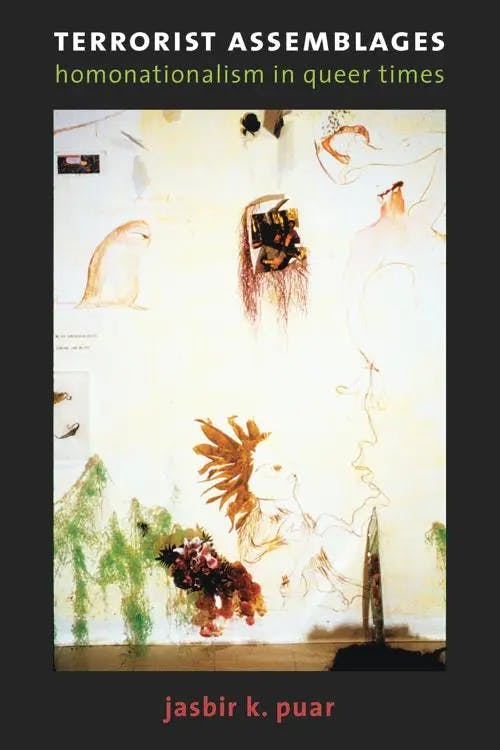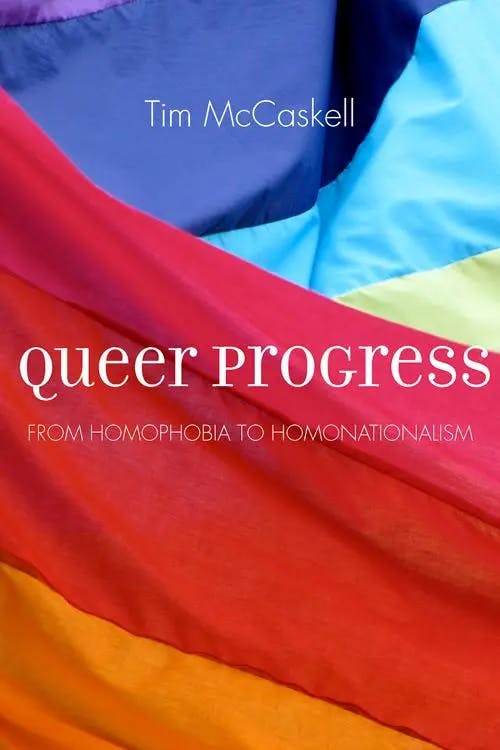What is Homonationalism?
MA, Gender Studies (London School of Economics & Political Science)
Date Published: 10.03.2023,
Last Updated: 18.06.2024
Share this article
Defining Homonationalism
Homonationalism is a term coined by Jasbir Puar in her 2007 publication, Terrorist Assemblages: Homonationalism in Queer Times. Originally formulated within the context of US nationalism, Puar defines homonationalism as,
The dual movement in which certain homosexual constituencies have embraced U.S. nationalist agendas and have also been embraced by nationalist agendas.
Jasbir K. Puar, Inderpal Grewal, Caren Kaplan, Robyn Wiegman
The dual movement in which certain homosexual constituencies have embraced U.S. nationalist agendas and have also been embraced by nationalist agendas.
Puar’s coining of this term emerged from her scrutiny of supposedly progressive and inclusive policies enacted by the US government. These were policies which condoned homosexuality but only on the terms that homosexual individuals, to some degree, were also perceived to uphold nationalist values. Oftentimes a government or political organisation may create or maintain systems of power within society that determines the supposed worth of minority groups. Within those minority groups, the supposed worth of an individual may be contingent on how much they represent or uphold other values that a government or organisation endorse. This is where homonationalism comes in, as a potential explanation for how LGBTQ+ individuals are speciously valued within these systems of power. To understand homonationalism we must first ask, how do we identify and interrogate a government’s social acceptance for minority groups? And what are the contradictions and complications of a government embracing gay or queer culture as a means of promoting a nationalist agenda?
Pinkwashing & Homonationalism
To understand homonationalism we must first understand what is meant by the term ‘pinkwashing’. In Sarah Schulman’s (2011) New York Times article, Israel and Pinkwashing, Schulman defines pinkwashing in the context of the Israeli and Palestinian conflict:
Pinkwashing: a deliberate strategy to conceal the continuing violations of Palestinians’ human rights behind an image of modernity signified by Israeli gay life.
Schulman goes on to mention that Professor Aeyal Gross of Tel Aviv University has argued that “gay rights have essentially become a public-relations tool”, although “conservative and especially religious politicians remain fiercely homophobic.”. Pinkwashing is a means through which a government or organisation can distract from other matters of inequality, oppression or discrimination by positioning themselves as a champion of gay rights.
Through pinkwashing we can begin to understand how it benefits a country’s government to embrace gay communities as part of their agendas- but how is this different from LGBTQ+ acceptance? Why might this nationalism prove harmful for the gay community or other marginalised communities?
Returning to Puar’s Terrorist Assemblages, she describes how homonationalism is often an intersectional matter- whose influence transcends gender and sexuality and impacts matters of racial and nationalist identities. Of homonationalism Puar states that,
This brand of homosexuality operates as a regulatory script not only of normative gayness, queerness, or homosexuality, but also of the racial and national norms that reinforce these sexual subjects. There is a commitment to the global dominant ascendancy of whiteness that is implicated in the propagation of the United States as empire.
Jasbir K. Puar, Inderpal Grewal, Caren Kaplan, Robyn Wiegman
This brand of homosexuality operates as a regulatory script not only of normative gayness, queerness, or homosexuality, but also of the racial and national norms that reinforce these sexual subjects. There is a commitment to the global dominant ascendancy of whiteness that is implicated in the propagation of the United States as empire.
Puar’s definition of homonationalism has, through the influence of both her and additional academics such as Sarah Schulman, Gaetano Venezia III and Maya Mikdashi, been reformulated since the term was coined. Predominantly this definition has been expanded in its applicability to other nations- but the mechanisms of homonationalism appear largely the same regardless of the country in question.
In the above quote, Puar specifically notes the “global dominant ascendancy of whiteness” that is tied to the political power of the United States of America. Puar is arguing, with regards to the “regulatory script” that homonationalism requires gay individuals accepted under nationalist agendas to be aligned with and even perform within the bounds of a nation’s values. Although Puar notes a racial aspect in the nationalist values of the US, when we consider the values of a government such as that of the United States we may imagine several different attributes. For example, we can argue that the US is pro-capitalism and pro-military; therefore, gay individuals who are productive workers or even serve their country in a military capacity are likely to be deemed more favourable or even more ‘American’, in spite of their sexuality. In the following section, we will look more closely at homonationalism in the US military and how this ‘inclusion’ of gay citizens into these nationalistic communities does not inherently equal acceptance of sexual diversity.
Transpatriotism and Chelsea Manning
As previously mentioned, Puar’s definition of homonationalism has been expanded upon in recent years- particularly to address how members of the transgender community fit into this model. The term ‘transpatriotism’ has been used alongside homonationalism, which gender scholar Mia Fischer characterised in Contingent belonging: Chelsea Manning, transpatriotism, and iterations of empire (2016) as “unwavering devotion to the state and an adherence to the gender binary” .
With transpatriotism, transgender individuals are accepted in society on the grounds that they uphold particular values of the state and nation, as with homonationalism. Fischer showcases this in her analysis of the legal and social responses to Chelsea Manning’s whistleblowing activities. Working as an intelligence analyst for the US Army in 2010, Manning leaked classified information to WikiLeaks. This information exposed the operations of the US military which included collusion with the Saudi Arabian government and Yemen’s president, as well as a helicopter attack which killed twelve people, including two journalists. Manning, who came out as transgender during her imprisonment, was derided and cast out from the trans community by many of her transgender peers in the military. Fischer’s summary of this issue clearly highlights how this social exile occurred,
As transgender veterans ostracized Manning for threatening national security she was rendered the treacherous black sheep of the trans community that deliberately used her struggles with gender identity as a pretext for her deeds. Manning was not deemed worthy of inclusion in US exceptionalism nor the rights and privileges – for example, to a fair and speedy trial – granted to other US citizens.
When Fischer mentions this “US exceptionalism”, she is referring directly to a term used by Jasbir Puar, US sexual exceptionalism, which argues that this exceptionalism relies on “not only on extraordinary forms of national heteronormativity, but on the deployment of certain domesticated homosexual bodies in order to reinforce US nationalism” (Fischer, 2016).
Manning was not granted all the privileges that come with this exceptionalism because her actions were deemed anti-military and therefore anti-American; she couldn’t be ‘excused’ for her transgender identity and granted the same rights as her cisgender counterparts because she did not uphold national values. In this example we can see how what may appear as acceptance for LGBTQ+ individuals inside systems such as the military is actually conditional and contingent on an alignment with particular values. If a gender or sexuality diverse person is somehow opposed to those values (or belongs to another marginal social group), this exceptionalism isn’t available to them.
How does Homonationalism relate to different social theories?
As previously mentioned, homonationalism requires an intersectional awareness of social issues. An intersectional perspective allows us to understand how individual identities are comprised of characteristics such as race, gender, sexuality, social class and physical ability, to name a few. Homonationalism challenges the idea that gay individuals who are accepted under the nationalist values of a country are fully accepted. This ‘acceptance’ is often conditional and contingent on other facets of an individual’s identity beyond their sexuality being aligned with nationalistic values. To learn more about intersectionality check out our guide to the subject here.
As has become evident in our exploration of homonationalism, hierarchies of power exist which determine how LGBTQ+ individuals are valued within society, and how these hierarchies are used to control and regulate behaviour of marginal communities. These systems of power became the focus of an academic movement in the late 20th Century which sought to explain the policing of bodies in society based on gender and sexuality. This academic movement has consolidated into what is now known as Queer Theory. Homonationalism is often used as an example of Queer Theory in practice- displaying systems of power being used to ostracise, disempower or dehumanise gender and sexually diverse individuals who do not uphold particular values (e.g. nationalism).
Significant theorists on the subject of Homonationalism
Sarah Schulman’s aforementioned New York Times article is but the tip of the iceberg of Schulman’s writing on homonationalism, and as a Jewish scholar, Schulman’s insight into the Israel/Palestine conflict is invaluable. Schulman’s Israel/Palestine and the Queer International is a text which allows homonationalism to be explored outside of merely critiquing US government policies. Schulman’s text also effectively explains how homonationalism is used tactically during modern wartime to influence media coverage and the perspectives of other countries.
In this chronicle of political awakening and queer solidarity, the activist and novelist Sarah Schulman describes her dawning consciousness of the Palestinian liberation struggle. Invited to Israel to give the keynote address at an LGBT studies conference at Tel Aviv University, Schulman declines, joining other artists and academics honoring the Palestinian call for an academic and cultural boycott of Israel. Anti-occupation activists in the United States, Canada, Israel, and Palestine come together to help organize an alternative solidarity visit for the American activist.
Sarah Schulman
In this chronicle of political awakening and queer solidarity, the activist and novelist Sarah Schulman describes her dawning consciousness of the Palestinian liberation struggle. Invited to Israel to give the keynote address at an LGBT studies conference at Tel Aviv University, Schulman declines, joining other artists and academics honoring the Palestinian call for an academic and cultural boycott of Israel. Anti-occupation activists in the United States, Canada, Israel, and Palestine come together to help organize an alternative solidarity visit for the American activist.
Tim McCaskell’s Queer Progress: From Homophobia to Homonationalism is also a very useful text for any scholar looking to understand the economic power of the ‘pink dollar’- the capital contingent on a desire to market towards (and profit from) the LGBTQ+ community. McCaskell’s publication conveys the development of the gay rights movement from a push for policy change and social reform into the upholding of ‘visibility’- sometimes at the extent of true inclusion of sociopolitical safety. Grounded in real-world examples of these social mechanisms, McCaskell evidences the theory of homonationalism extensively.
Tim McCaskell contextualizes his work in gay, queer, and AIDS activism in Toronto from 1974 to 2014 within the shift from the Keynesian welfare state of the 1970s to the neoliberal economy of the new millennium. A shift that saw sexuality —once tightly regulated by conservative institutions—become an economic driver of late capitalism, and sexual minorities celebrated as a niche market.
Tim McCaskell
Tim McCaskell contextualizes his work in gay, queer, and AIDS activism in Toronto from 1974 to 2014 within the shift from the Keynesian welfare state of the 1970s to the neoliberal economy of the new millennium. A shift that saw sexuality —once tightly regulated by conservative institutions—become an economic driver of late capitalism, and sexual minorities celebrated as a niche market.
Homonationalism is a term which continues to be reformulated and expanded upon as the literature around this subject develops. With the growing scholarly interest in gender and sexuality diversity, this term may continue to be adapted as conceptions of identity and nationalism change with the times. But what Jasbir Puar contributed with homonationalism is a term that articulates how inclusion does not always equal acceptance. Homonationalism allows us to understand how the motives of governmental power can be used to delineate who is perceived to be valuable or dissenting within a state or nation. With time, a more widespread understanding of this term may allow scholars and activists alike to confront these delineations and incorporate a more nationalism-conscious praxis into identity politics.
Further Resources & Reading on Perlego
Homonationalism, Femonationalism and Ablenationalism: Critical Pedagogies Contextualised – Angeliki Sifaki
Gay Rights, Military Wrongs: Political Perspectives on Lesbians and Gays in the Military – Craig A. Rimmerman
Capitalisms and Gay Identities – Stephen Valocchi
Homo Economics: Capitalism, Community, and Lesbian and Gay Life – Amy Gluckman, Betsy Reed
Bibliography
Fischer, M. (2016). Contingent belonging: Chelsea Manning, transpatriotism, and iterations of empire. Sexualities, 19(5-6), 567-586.
Puar, J. K. (2018). Terrorist assemblages: Homonationalism in queer times. Duke University Press.
Schulman, S. (2011). Israel and ‘pinkwashing’. New York Times, 22.
McCaskell, T. (2018). Queer Progress (1st ed.). Between the Lines.
Schulman, S. (2012). Israel/Palestine and the Queer International. Duke University Press.
MA, Gender Studies (London School of Economics & Political Science)
Georgie Williams is a deferred doctoral student in the field of Social Justice at University College Dublin and founder of gender & sexuality research hub, /Queer. Georgie’s research predominantly focuses on the development of gender and sexuality related social practices in post-colonial countries and the application of reflexive feminist methodologies to anthropological and sociological field research.



